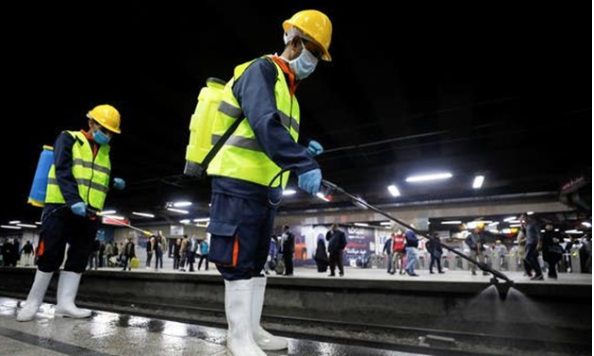The Egyptian Ministry of International Cooperation has published a full report of the national efforts and plans to face the novel coronavirus (COVID-19) and curb its spread, as Egypt has reported a total of 2,350 cases.
As the potential risks of coronavirus continue to rise, the ministry said 27 laboratories across the country have the capacity to test cases, noting that additional four laboratories and also university laboratories will be added.
The country has been working on scaling up Infection Prevention and Control (IPC) programme with the World Health Organization (WHO) to prevent transmission and ensure patients and health workers are protected, the report said.
Among the efforts is expanding capacity to conduct up to 200,000 tests within two weeks, recurring 15-Day sterilization campaigns to be carried out in cities and villages to step the virus spread, adding acute-care capacity, providing ventilators and building stock of other critical medical supplies such as personal protective equipment.
The ministry said that eight isolation hospitals with a capacity of 2,000 beds have been set up, including 1,000 Intensive care beds and 400 ventilators. Field hospitals have been set up for mild and asthenopic cases, the report added.
The report highlighted the keenness to combat digital wildfires and ensure the public is updated on the current situation, including working with other sectors to reach vulnerable populations, considering this a key priority.
The ministry also announced the implications of the crisis on global and local economy
Local economy
– Remittances ($26.8 billion): Remittances (10% of the Gross domestic product), particularly the ones from Gulf countries, could be affected by the drop in oil prices and employee dismissals by affected companies.
– Tourism ($13 billion): Tourism receipts (5% of GDP). Inbound tourism reservations have dropped by 80% in comparison with the same period last year.
– Suez Canal revenues ($5.9 billion): The decline in global trade and transportation could have a negative effect on Suez Canal revenues.
– Changes in oil and energy prices: The ongoing oil war led to a sharp drop in international oil prices, exacerbated further by the collapse in global demand, could affected the sector in Egypt.
– Increase in commodity import prices: As Egypt is a big importer of commodity goods, it is susceptible to possible price increases.
Containing the economic impact
– The national strategy focused on reducing the price of natural gas for all industrial activities, bringing the price of gas supplied to $4.5 per million British thermal units in March 2020, compared to $6 per million Btu in October 2019, and $8 per million Btu in June 2014.
– Reducing the price of electricity for heavy usage industries to LE 0.10 ($0.0064) per kilowatt hour down from LE 1.10, and leave electricity prices for other industries stable for three to five years.
– Postponing real estate tax payment due on factories for the period of 3 months.
– Providing export subsidies of LE 1 Billion to exporters for March and April 2020.
Social protection and reform agenda
– Labor force: The efforts include mitigating impact on an un-organized labor force through employment protection legislation and unemployment benefits and transition from an informal to a formal sector.
– Social reform: Putting forward a social protection and social safety agenda, including offering informal workers one-off monetary compensation (L.E. 500). Registration had been done for approximately 1 million individuals working in construction, agriculture, fishing, plumbing etc.
It also includes adding 60,000 households to Takaful and Karama Program. An additional 100,000 will be added and in FY21 budget will increase to LE 19.3 billion compared to LE 18.5 billion.
Concerning women protection, the strategy includes increasing payments to women community leaders in rural areas from LE 350 to LE 900 per month.
– Financial inclusion and digital reform: Advancing financial inclusion for economic empowerment.
